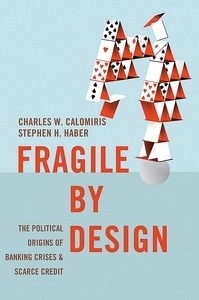Fragile by Design
The Political Origins of Banking Crises and Scarce Credit

Calomiris, Charles W.
Haber, Stephen H
Editorial Princeton
Fecha de edición agosto 2015 · Edición nº 1
Idioma inglés
EAN 9780691168357
584 páginas
Libro
encuadernado en tapa blanda
Resumen del libro
Why are banking systems unstable in so many countries--but not in others? The United States has had twelve systemic banking crises since 1840, while Canada has had none. The banking systems of Mexico and Brazil have not only been crisis prone but have provided miniscule amounts of credit to business enterprises and households.
Analyzing the political and banking history of the United Kingdom, the United States, Canada, Mexico, and Brazil through several centuries, Fragile by Design demonstrates that chronic banking crises and scarce credit are not accidents. Calomiris and Haber combine political history and economics to examine how coalitions of politicians, bankers, and other interest groups form, why they endure, and how they generate policies that determine who gets to be a banker, who has access to credit, and who pays for bank bailouts and rescues.
Fragile by Design is a revealing exploration of the ways that politics inevitably intrudes into bank regulation.
Biografía del autor
Charles W. Calomiris is the Henry Kaufman Professor of Financial Institutions at Columbia Business School. He is also a research associate at the National Bureau of Economic Research, a member of the Shadow Financial Regulatory Committee and the Financial Economists Roundtable, and the coordinator of the Bank Performance and the Economy program at the Center for Financial Research at the Federal Deposit Insurance Corporation. Until 2007, he was the co-director of AEI's Financial Deregulation Project. His research at AEI spanned several areas, from banking and corporate finance to financial history and monetary economics. Calomiris also served on the 2000 International Financial Institution Advisory Commission. Known as the Meltzer Commission, this congressionally mandated group recommended specific reforms of the International Monetary Fund, the World Bank, the regional development banks and the World Trade Organization to the U.S. government.








